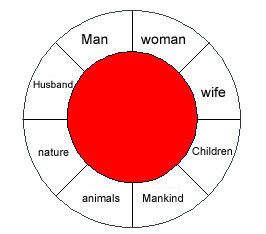 |
|
 |
|
Vol.10
What is love? Part1. |
|
|
<“What is love?”- 47 years ago>
It was 47 years ago that I
entered university to study
law. I joined a law related
club in the spring of my
freshman year, and a welcome
party for new members was held
in Hakone. In the evening, a
professor who was supervising
the club said to the new
members, “I will give each of
you a theme. Come to me with
your answers by graduation in 4
years time.”
We were
all flabbergasted when we
received our themes. In my
case, it was “What is love?”
<4 years of struggle>
That’s where the trouble
started. With a theme that may
be said to be difficult to
tackle even for the top
philosophers, it was initially
a continuing process of trial
and error, which was not even
funny.
Nevertheless,
after about a year, I had a
somewhat clearer image of my
theme, and realized that I
would not get anything like an
answer unless I started from
the question, “What is man?”
As for my lifestyle, what
with classes and a lot of my
time also spent on club
activities as well as some
part-time work and hobbies such
as fishing, I was constantly in
top gear and was rarely at home
on weekends.
But as I
worked my way through my given
theme, I naturally got into the
habit of searching for answers
through questioning everything
I encountered, asking why.
Come to think of it now, I
think the professor gave us
themes and told us to work on
them for 4 years in order to
teach us the importance of
asking “why”.
<My answer
4 years later>
The
report on “What is love?” that
I submitted to the professor
before graduating consisted
only of a diagram like the one
below on a B5 sheet of paper,
and I gave a verbal
explanation.

The red circle in the
center is energy that everybody
possesses, and love is merely
realized as a pattern depending
on where this energy is
directed toward. “Love is the
energy itself that human beings
possess” was my answer, and I
told the professor, “I could
only get this far.”
After looking at the diagram
for a while, the professor
said, “What you studied in the
last 4 years will be useful in
10 years time after
graduation.” At that time, I
did not know what the “10
years” meant, but later there
was many a time when I felt
that it all seemed to make
sense.
I realized that
by combining the life
experience gained after
graduation with the knowledge
accumulated by academic work
and reading while at
university, you gradually
acquire a sense of judgement
and balance, and after around
10 years, your future direction
and color are more or less
defined.
|
|
|
|
 |